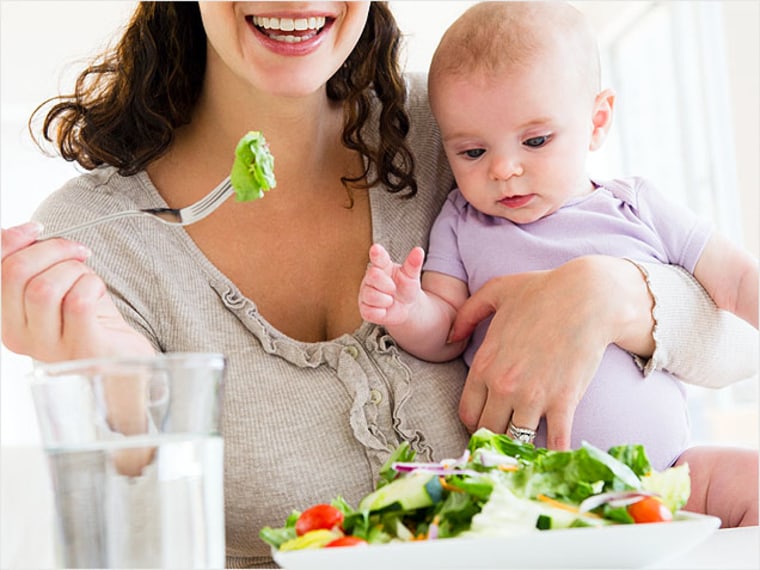Breastfeeding every couple of hours (plus burping, rocking and changing diapers) means you barely have time to pee, let alone eat a square meal. But your breastfeeding diet is extra important because it helps boost your energy, giving you the stamina you need in your new role as a mom. Here's what you need to know about what to eat when you're breastfeeding.
How do I make sure my breast milk is healthy?
Unless you consume a very low-calorie diet or consistently eat from a single food group, the quality of your breast milk will stay about the same no matter what you eat. But if your body doesn't get the nutrients it needs, it'll draw from your own reserves, leaving you feeling run down. Don't stress over the occasional pepperoni pizza and ice cream splurge, but think of your breastfeeding diet as a continuation of the healthy eating you did (right?) when you were pregnant.
What are the best foods to eat when breastfeeding?
A balanced diet with good variety is your best bet, so try to achieve a mixture of healthy carbs (three or more servings a day of whole grains, including brown rice, whole wheat bread, pasta and cereals), fruits and vegetables (four or more portions in every color you can find!) and three servings of lean protein. Don't forget low-fat dairy, too: Breast milk is loaded with calcium to build your baby's bones, so get enough of this vital nutrient (three to four servings a day) for the both of you.
Healthy fats like canola and olive oils, avocados and nuts should have a place in your breastfeeding diet, too (although you don't need as much as you did when you were pregnant), as should foods containing DHA, an omega-3 fatty acid that may help promote baby's brain growth and visual function. "One of the great benefits of breastfeeding is that DHA occurs naturally in the milk," says Allison Walsh, former Lamaze president and a certified lactation consultant. To get some extra into your diet, eggs fortified with DHA are an easy pick, as are fatty fishes like wild salmon and sardines. To cover the rest of your nutritional bases, keep taking your prenatal vitamin for the first month or so and then ask your doctor whether you should take a multivitamin.
Is dieting while breastfeeding safe?
Breastfeeding burns about 200-500 calories a day, so even without an official 'diet' your body will be toasting calories just by making milk. In general, most women need 2,000 to 2,500 calories a day to keep up their energy and maintain a healthy milk supply. If you plan to go on a diet, wait until after the second month and don't decrease calories too rapidly—going much below 1,800 a day may affect your milk production. Most new moms can safely drop about a pound a week; skip fad diets completely, including all-liquid diets, low-carb diets, cleanses and more.
Are there foods I should avoid when breastfeeding?
As long as your diet is healthy and varied, you can pretty much enjoy all of your favorites dishes. However, be careful with the following:
Alcohol: Wine can return to your diet (yay!), but definitely keep it to a minimum. "I wouldn't have more than one drink if your baby is still breastfeeding every two to three hours," says Dr. Ari Brown, a pediatrician and author of Baby 411. If you do plan to have a drink, do so after you've nursed your baby to give the alcohol time to pass through your bloodstream (about 2 to 3 hours per drink). If you can't wait this long, you may need to 'pump and dump' (use a breast pump instead of nursing and then dump the milk down the drain).
Fish: Sushi can also be on the menu again, but avoid those same fishes that were off limits during pregnancy because of high mercury levels (swordfish, king mackerel, shark and tilefish). Also, remember the tuna warning: solid white or albacore tuna also tends to be high in mercury, so limit it to 6 ounces a week; the chunk light variety is lower in this heavy metal (you can safely have 12 ounces a week).
Coffee: Caffeine can get into breast milk and accumulate in your baby's system, which may interfere with his sleep and cause irritability. Limit your morning joe to one or two cups a day. (And we're not talking about venti-sized cups!)
Common allergens: "If either parent has a specific allergy, the baby has a greater likelihood of developing that allergy, too," says Walsh. Ask your doctor whether your breastfeeding diet should exclude certain allergenic foods, including peanuts, tree nuts, eggs and shellfish.
Should I try an elimination diet while breastfeeding?
When a mom is breastfeeding, certain foods she's eaten can sometimes cause an allergic reaction, discomfort or irritation in her baby. An elimination diet is one that attempts to identify these foods and take them out of the diet for a couple of days. If you notice your baby experiencing symptoms like eczema, fussiness, congestion or diarrhea, speak with your doctor about possibly eliminating some foods. He'll explain which items may be the culprits (typically dairy, soy, wheat, eggs, nuts or corn/corn products), how long to avoid them and when you can add them back to your breastfeeding diet.
A version of this story originally appeared on iVillage.
